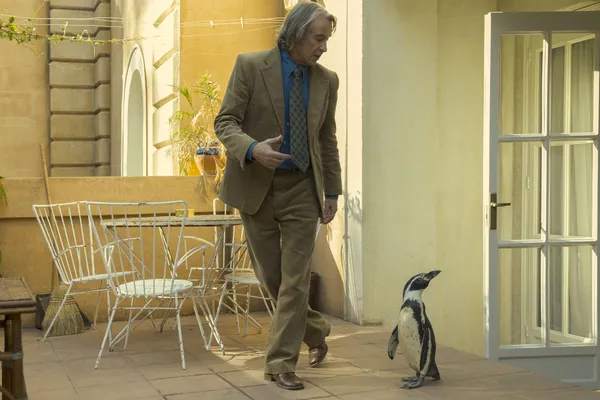 |
| Steve Coogan as Tom Michell and Baba/Richard as Juan Salvador in The Penguin Lessons Photo: Andrea Resmini. Courtesy of Sony Pictures Classics |
Director Peter Catteneo and screenwriter Jeff Pope's adaptation of Tom Michell's memoir, The Penguin Lessons, stars Steve Coogan as the disillusioned and cynical Englishman, who takes up the position of English teacher at the prestigious St. George's private school in Argentina in 1976.
When a military coup forces the school to temporarily close, Michell travels to neighbouring Uruguay, where he rescues a penguin who he first names Peter, before settling on Juan Salvador. In spite of his initial reluctance to embrace Juan Salvador's affections, this unexpected friend helps him to inspire his students.
When the political tensions penetrate the school's walls, Michell must confront the horrors of authoritarian rule.
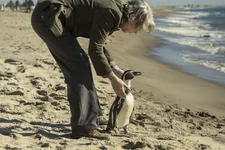 |
| Tom urges Juan Salvador to return to the sea. Photo: Andrea Resmini. Courtesy of Sony Pictures Classics |
Catteneo's previous films include 1997's The Full Monty, about unemployed steelworkers forming a male striptease act, 2001's Lucky Break, which follows a group of inmates planning to stage a musical to break out, and 2019's Military Wives, a drama about a group of wives who form a choir while their husbands are serving overseas.
In conversation with Eye For Film, Catteneo discussed trying to surprise the film's audience, focusing on the emotional effects of the political turmoil, and finally working with Steve Coogan.
Paul Risker: How would you describe your relationship to cinema?
Peter Cattaneo: Well, there are two relationships. One is working in cinema and the other one is my experience as a punter. As a punter, I suppose it's about escaping, but not escaping for those two hours, and not mindlessly escaping. It's about immersing yourself in another person or group of people's stories for that time and hopefully learning something.
I like learning about the human condition or a world I didn't know about. I also like identifying with people, even if they're in very different situations to me. I like empathising — maybe it's a more heightened version or a foreign land version or an outer space version, but I like empathising with those universal emotions that everyone feels.
PR: What appealed to you about Jeff Pope's adaptation of Tom Michell's memoir?
PC: The first thing that appealed was that it just seemed such an extraordinary, original and exciting story — only a true story could find something so extraordinary with this many interesting elements. I felt there could be humanity, and I was very interested in that period of time in Argentine history. I didn't know about a private school in the middle of civil war-torn Argentina, and I've been there. It's literally like you're walking off dusty Argentine suburban streets, through a door where it's cricket bats and strawberries and cream. I just thought that was fascinating and cinematic.
The penguin was probably the last on the list of things that appealed because it felt more like a watch-out, in terms of it not just being a cute pet movie. But that also felt like a challenge — can you do a man and a penguin but not deliver what you feel you should deliver with that kind of story about a friendship between a man and an animal? Instead, could you try and do it in a different way?
PR: Cinema is a shared language and so there's always that friction between familiarity and originality. As you say, it's often about finding a new slant to the familiar.
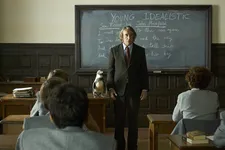 |
| Juan Salvador helps Tom Michell to teach poetry. Photo: Lucia Faraig Ferrando. Courtesy of Sony Pictures Classics |
PC: They say there are only seven stories or whatever it is. So, a familiar story, but in a context that's in a world that's different, or you tell a story that everyone knows what they're going to get, but you surprise them with how they get there. But this really did feel like it had so many completely original elements, and particularly in the setting.
It was always going to be fresh, and no one has ever said, "Oh, not another penguin in 1976 Argentina," which is probably a small story.
There's always going to be something to fall back on. There are lots of good teacher stories; there are quite a few films set in old boarding schools. We were never trying to make, nor did we have the space or the right really to make an in-depth study of the 'Dirty War' in Argentina. We did want to acknowledge it and show enough that people who might not otherwise normally go, who would probably shy away from a heavier political film, would learn a bit about it and be intrigued to go and find out more.
It has been interesting, because people who have come to see the film have said, "Oh, I didn't know anything about that part of Argentine history." I think, particularly in America and in England, it was never on the curriculum. We just didn't know anything about it, and I knew very little until I started researching the film. So, along the way, it was an educational journey for me.
PR: The Penguin Lessons and other films about these violent dictatorships, who oversaw the forced disappearances of countless persons, are a necessary acknowledgement of human trauma.
PC: The political situation was complicated, and, of course, the fascist military dictatorship didn't just spring out of nowhere. When the military took over, there was all sorts of unrest — even the whole of the left was incredibly fractured and complicated. So, we couldn't really get into that.
From the people I spoke to who lived through it, you just didn't know what was going on. You'd hear someone had gone, but you had no point of contact and no way of knowing where they were. It's a big brotherly way of playing with people's minds through fear. We just tried to get the essence of that without getting into all the details, because that's not what the film's about. We look at the emotional effect it had on people.
PR: Going into this private school setting, you explore the way politics intrudes upon adolescence. The boys themselves show signs of right- and left-wing leaning sympathies, which Michell challenges. A deeper question emerges about what the boys will do with their privileged education.
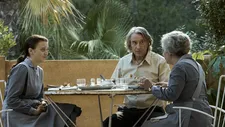 |
| Tom Michell gets to know the school staff Photo: Lucia Faraig Ferrando. Courtesy of Sony Pictures Classics |
PC: Teachers are great characters and you know the good teachers because they're passionate about the subject. It's more interesting because they're talking about it in the present; they're not just regurgitating the syllabus. In the early scenes, he dials it in, and he's like a dead man walking, who's just going through the motions. In his arc, he goes from being that sort of teacher to a really passionate one. It was interesting, because for the reaction shots of the kids, you didn't really need to direct the movie because they were engaged.
That's something we changed from the book because the real Tom Michell was a lot younger.
I went to the actual school and met some people. One guy who is a teacher now and another who is on the board of governors were in the class of '76.
PR On the subject of creative license, is the process of adaptation less about being literally faithful to the source material, and instead honouring its spirit?
PC: Tom Michell is a lovely guy. He's still around, and he's very passionate about the film. When Steve came on board, there was obviously a question asked because he's literally twice as old as Tom Michell, who was a young guy in the 1970s. Back then, a lot of people wanted to go and see Latin America, and thought they'd just go over there, and find a job as an English teacher. That's what he did, and he found this penguin.
The story doesn't really deal with his inner journey. It's more about growing up and, really, it's a travelogue. It's about his eyes being opened to this new place, but there's no inner journey. He's a nice guy at the beginning; he's a nice guy at the end. Steve was interested in the project because he knew Jeff and he was interested in Argentina.
This is a fundamental change to the book, but it makes a much more interesting character who's disillusioned, who's had enough of teaching, and is just running away from his demons. It's a more interesting counterpoint to the cuteness of the penguin, because you've got sweet and acid together, and it's much funnier and more dramatic.
It gives Michell a bigger space to change. Tom talks about that penguin as not just being a penguin, but as Juan Salvador, an extraordinarily unique and unusually intelligent bird. Whether his memory has rewritten it for him, because it was 50 years ago, that's how he talks about it. He told us, "As long as you get that right."
It's more interesting if it's cinematic, and just for the tone of the film, it gives him somewhere to go from not liking penguins and not really liking anything, to softening up just a little bit. Steve plays it very well. He just doesn't turn into a superhero; he softens up a little bit and starts to engage with people around him again.
PR: Coogan, of course, brings a particular presence to the part of Michell.
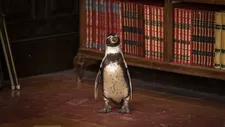 |
| Juan Salvador gets - and gives - an education Photo: Sophie Koehler. Courtesy of Sony Pictures Classics |
PC: He's very British, and he's very popular here in America. But, yes, he's got a natural cynicism, which is great for this version of Tom Michell. Steve has immaculate comic timing, and he's very good at physical comedy as well. So, shooting the stuff in The Penguin Lessons, like when he's trying to get rid of the penguin on the beach, it's just great because, like Stan and Ollie, he's well versed in the classic rules of comedy, physical comedy and timing. So, it's a real joy to work with him.
When an actor doesn't get that kind of thing, you can't explain it to them. But once they get it, then you can add things, and you can help them.
I've wanted to work with Steve for years and combining him with Jeff, they came up with material that's right in my wheelhouse. It has a serious side, but it also has a certain liberty at times as well. So, yeah, it's a dream come true, and we have another project which I'll hopefully get going. So, it has been a successful collaboration.
PR: One of the central themes that emerges through a couple of key scenes is how precious life is, and how we are prone to wasting its value, not only for ourselves but for others too.
PC: Jeff probably stopped and really thought about what he was saying. I personally took it on a more instinctive level — of what felt right. You almost discover stuff as you're making it, and I knew there was this thing of an animal humanising humans and making them more civilised to each other. But when we were shooting, it struck me, even on set, it's a bit like why families have a dog. You've got this random thing that takes everyone out of themselves - out of their little irritations with each other. It's a bit of chaos in the middle of everything that just helps people connect with one another and forget themselves.
Steve's character in The Penguin Lessons starts to be more decent to the people immediately around him, and I think these days everyone talks the talk. They've got lots of very virtuous things to say, but first, just be decent to each person you meet every day of your life. If you don't know someone and you don't like their opinion, they are just another person, so, just be decent.
Michell is civilised in a weird way. He's pretty caustic at the beginning of the film and he just becomes a slightly better person. He does engage in the political situation, but he doesn't really have any effect. They're completely misguided attempts that don't do anything, but at least he tries, and he has woken up.
The Penguin Lessons was released in US theatres nationwide on March 28th.
























